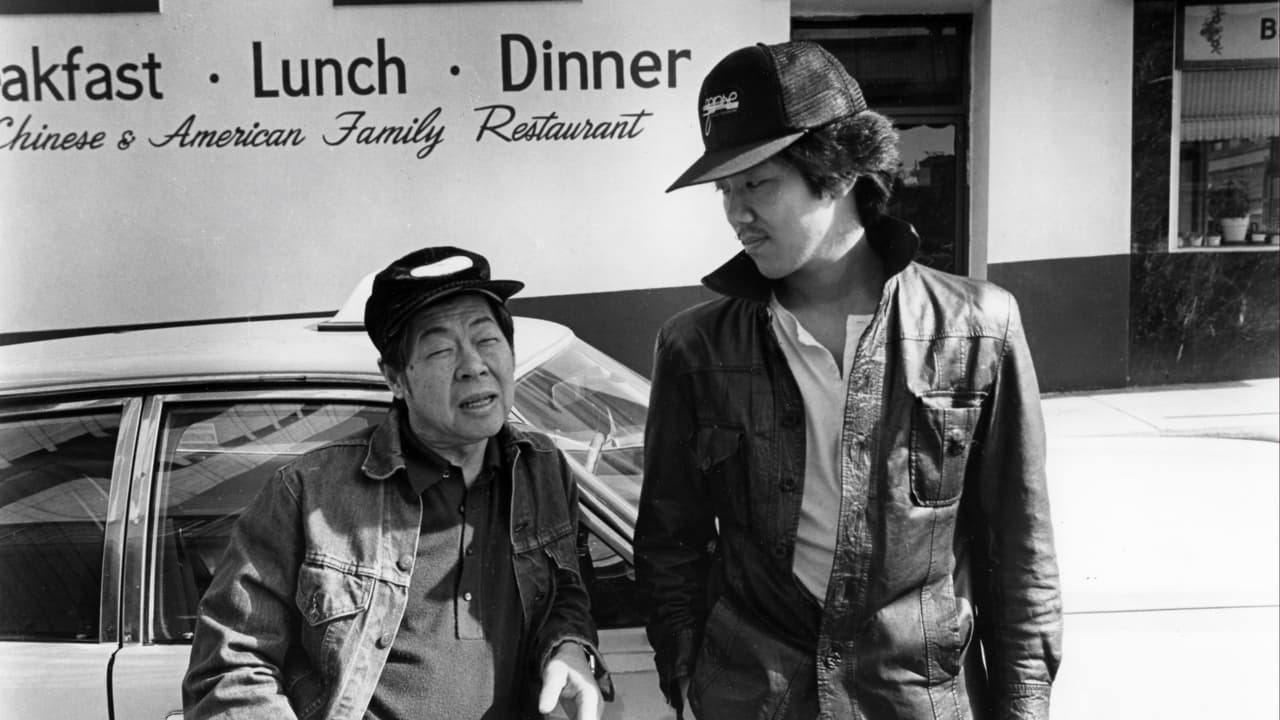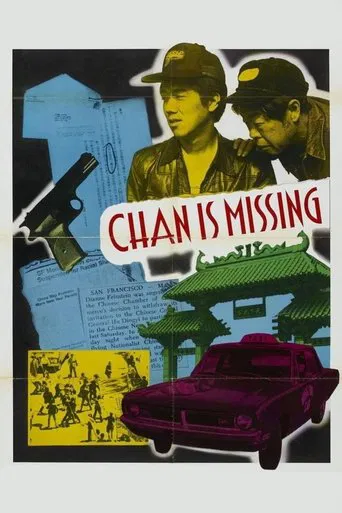

Here is a film like a Zen koan. Made for $20,000.00 dollars, it is obvious that the director Wayne Wang chose to focus on thematic content rather than be overly concerned about production values. This is a thoughtful and amusing story about a couple of cabbies who fork over $4,000.00 in cash to Chan Hung to go into business for themselves, and then spend the rest of the film looking for him. The more they search for him, the more we find ourselves entering upon a kaleidoscopic journey through the Chinese American community. We find everyone we meet reflecting Chan in some form or fashion without encountering Chan himself.The whole affair moves like a mystery of some kind. Wood May plays the older cabbie Jo and Marc Hayashi plays Steve. You could almost say they are a cinema verite' version of Charlie Chan and his number one son. But then we would be missing the point. After all, Chan is missing. What we have in his place is a vacuum filled with meditations about assimilation and the best things that the American and Chinese cultures have to offer each other. We see all this in terms of the unusual characters that are presented to us.Once again there is a Film Noir feel to this piece as Jo and Steve move about Chinatown talking to Chinese locals who may know Chan or have seen him. CHAN IS MISSING proved to be both a critical and commercial success, especially considering its low budget beginnings. Jo and Steve piece together clues that tantalize and lead to dead ends, seem to be getting nearer to Chan and possibly flirting with foul play or real danger of some kind to themselves or their missing business associate. People call in the middle of the night and Chan's wife seeks an audience with them. But despite all this, the air of mystery surrounding Chan's disappearance never seems to completely dissipate.The upshot reveals the Chinese and Chinese American people in that space that Chan has left for Jo and Steve to explore. There is no real guile to this, just a chain of interesting encounters that fans out visually across the spectrum that is the Chinese American people. The more Jo and Steve focus on Chan, the more our point of view expands to include more than just Chan and any stereotypical impressions we might have about Asian people garnered from the movies and television. The people we meet in CHAN IS MISSING seem realer than that. That is the triumph of CHAN IS MISSING. We go looking for him and find all his people holding up a mirror to us.Finally viewing the Chinese and Chinese American people without preconceived notions and finding them peering back at us without any masks we marvel with Jo and Steve. Could it be that Chan is nowhere to be found? Should we find Chan at this point would it add anything more to our discovery?One of the things I'll never forget is when Jo and Steve meet with Chan's daughter as she returns to them their money. She tosses off a line to them that makes her seem like a Chinese American trying to sound like a Caucasian American attempting to talk like an African American. These scene said worlds about assimilation in a diverse American society and was a novel experience of insight.
... View MoreThese comments come as a counterpoint to the user review left some years ago, an opinion with which I completely disagree.I think this was a wonderful examination of the Chinese American character, at least in the eyes of a Mexican American (me). While the film addresses assimilation, as the previous reviewer expressed, that just scratches the surface of what it's telling you.This film highlights the depth of cultural differences, the conflicts faced by immigrants or those of immigrant background. But these are not just grandiose, operatic conflicts; they are daily, constant, and felt in both the major and minor issues of life. They are confronted in matters of life and death or musical preferences.This grand theme is presented in a lighthearted, often very funny, but subtly so, way. I found the storyline to be very interesting and exciting, not at all boring. It was a mystery, clues and leads leading to other leads or dead ends, interesting characters along the way. Yes, the search for Chan is secondary to the subtext, but it makes it no less entertaining.Car crashes? No. Shootouts? No. Sex and violence? No. But the film gives the viewer an alternate view of what is real, and an alternate context for the evaluation. Is it real, or is it not unreal? To me, this is both extremely funny and a brain burner.All this aside from the fact that this was a film made with seemingly real Chinese Americans, not big screen actors playing routine stereotypes. Look at Joe, and then listen to him speak, and see if it doesn't contradict some stereotypes burned into your head by Hollywood.This is a very good film.
... View MoreChan Is Missing begins with the old American classic "Rock Around The Clock", but here it's sung in Chinese. Be prepared to enter Chinatown as you have never experienced it in this 1981 no-budget film from director Wayne Wang.Filmed in Black and White with a cast of unknowns, Chan Is Missing uses the genre template of a mystery film to take us to the edge of a much bigger and more difficult human mystery Your friendly guide will be Jo (Wood Moy), a shambling, world-weary, Chinese-American taxi driver who has decided to go into the taxi business with his younger nephew Steve (Marc Hayashi). Calling themselves the Wing On Cab Company, they figure by splitting shifts, with Jo taking days and Steve taking nights, they both stand to make some decent money.However, in San Francisco, a special taxi licence is needed and they are hard to get. Chan Hung, a friend of Jo's from Taiwan knows where he can make a deal to sub-lease a taxi licence, but the deal is cash only.So, Jo and Steve pool their resources and come up with the $4000 dollars needed and they give the cash to Chan who goes off to finalize the deal.And that's that.After two days go by without any word from Chan, Jo and Steve begin to get worried, apparently, Chan is missing.They have no reason to suspect that Chan has stiffed them, but they do fear something may have happened to him. After all, Chan was relatively new to San Francisco. Their concern grows when they learn that Chan was involved in a fender-bender a short time ago and is also a no-show at his court appointment. A quick stop at the cheap hotel Chan lived at yields no information except that Chan hasn't been there for several days and a strange woman has also been looking for him (there is always a strange woman in a mystery).Jo thinks his friend Henry, a Chinese cook and restaurant owner might be able to help. Henry was a friend of Chan's back in China; in fact they studied aeronautical engineering together. But we gather that while Henry has been successful in America, Chan has faced disappointment.As Henry explains it, Americans won't hire the Chinese as engineers, they only want them "to make spring rolls." Henry is contemptuous of the food he has to cook for Americans and can't understand the popularity of Sweet And Sour Pork Ribs when the sauce alone makes him nauseous.And don't get him started on the tourists who order Won Ton Soup. He screams at his waiters to tell the Americans, "we don't have Won Ton Soup, tell them we have Won Ton spelled backwards, Not Now!" Eventually, Jo and Steve learn that Chan may be linked to an infamous "flag-waving incident" in San Francisco's Chinatown. At a recent Chinese Pride Day Parade, two different groups, one that supports the Peoples Republic Of China and another that supports a Free Taiwan, clashed on the street and Chan photographed the incident. Is his disappearance related to obscure Chinese Community politics? This clash also led to a notorious murder; is Chan involved with that? A promising lead takes Jo to a Chinese Community Center where he talks with George who taught English to Chan. George explains how some immigrant Chinese don't want to assimilate in the USA and this causes problems because a lot of their Chinese customs don't work over here.But the real problem comes from those who DO want to assimilate into white America as quickly as possible; the biggest problem being, obviously, they are not white. George tries to teach these people to retain the best things from Chinese culture and adapt them to the best things in American culture.Eventually, Jo tracks down the strange woman and it turns out to be Chan's wife, this is a surprise, as Jo did not know that Chan had a family. Yet, shortly after this meeting, Chan's daughter calls up Jo and Steve and returns their $4000 with apologies from Chan for not coming through with the taxi licence.Although Steve is happy to get the money back, Jo is even more confused. So are we. By this point, we have become very curious about who Chan is. But, no more so than Jo. After all, Chan was supposedly his friend and now after trying to find him, Jo has to conclude that he never really knew Chan at all.Also, Jo has not turned out to be a particularly good detective. At one point someone says to him, "Your nobodies concept of a Charlie Chan." Jo realizes this and muses to himself at one point, "If this were a TV movie, an important clue would pop up now and clarify everything." But that never happens.Over the course of the film, Chan is described variously as being: honest, paranoid, a genius, an idiot, sly, slow-witted, a failure, patriotic, "too Chinese" and it was noted by several people that he was especially fond of mariachi music. What we are left with at the end is Chan, the enigma.At the end of the film, Jo looks at a photograph of himself and Chan that was taken long before this Chan going missing business. Both men are standing outside a restaurant in Chinatown and Jo is poised in the sun and he is smiling, but Chan is standing in the shadows of a doorway, his features barely visible making Chan more of an enigma now than he was ever before.I was thoroughly enchanted by Chan Is Missing and I think you will be too.
... View MoreThe documentary type directing and acting style is absolutely brilliant! Wood Moy is stunning in his low-key naturalistic acting. Almost all of the characters in the film make you believe that there is no possible way they are not real people.Yes, the framework of the amateur investigation of the mystery provides incremental revelation of a truly fascinating subculture world. In toto, it shows the position and perspective of many different personalities in this world and how they relate to one another.Jo's cataloging of the various characters' opinions of the missing Chan illustrates how everyone's personal experience colors their perceptions. No innovative philosophies are interposed, yet the subtle notions we all have some inkling of are artfully insinuated upon our consciousness.This is truly an art film in the best sense of the term.
... View More